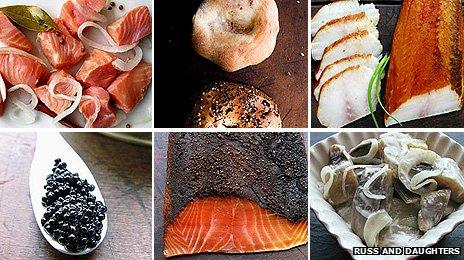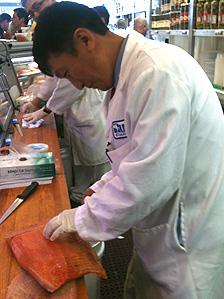New Yorkers stock up for Passover
- Published

Passover, one of the most important occasions in the Jewish calendar, begins on Friday. It commemorates the story of the Exodus, in which the ancient Israelites were freed from slavery in Egypt. And it's also a very busy time at New York's Jewish delis.
I am on the phone to Russ & Daughters - trying to order food for a party - and a quiet, familiar voice says: "Hello, Reggie, this is Sherpa Lox. How can I help?"
"Oh, good," I think. Sherpa knows his way around the lox and other delicacies I am hoping to buy at Russ, New York's great, appetising store.
But maybe I had better explain. Sherpas in New York? Lox? Appetising stores?
Joel Russ, a Jewish immigrant from central Europe, started selling smoked and pickled fish on Manhattan's Lower East Side in 1914.
Subsequently, his daughters took over. Then his grandson Mark Federman went to law school.
But Mark heard the call of the lox, it is said, and returned to run the store until - in the last half-decade or so - Mark's daughter Nikki and her first cousin Josh have taken over the business. Lox is in the blood.
In New York, an "appetising store" usually refers to a place that sells those fishy delicacies sometimes defined as "stuff that goes with bagels".
Head into Russ on East Houston Street, where the pink and green neon sign and a couple of neon fish - salmon, I think - wink over the door.
On one side are glass-fronted counters that contain golden-skinned, sweet-fleshed, smoked whitefish, smoked mackerel, smoked sable, smoked sturgeon.
There is home-made cream cheese and, behind the counter, the best bagels in town, also bialys and the onion rolls known as pletzel.
In the back, there is the caviar, pickled herring, herring in cream sauce, herring salad.
Before Jewish holidays, items like gefilte fish, matzo-ball soup and latkes (potato pancakes) are available to crowds who jam the shop.
"Take a ticket, please."
But at the very heart of the place is the lox and the nova.
In New York, almost everyone refers to smoked salmon as lox. Lox in fact is the cheaper, saltier, brined belly salmon.
Its more aristocratic cousin, cold-smoked salmon, often comes from Nova Scotia but New Yorkers use the term nova, to refer to all smoked salmon, except lox. Got it?
At Russ, displayed in all their glory, is smoked salmon from Ireland, Scotland and Norway.
There is even pastrami salmon, salmon spiced with pastrami flavouring.
Everest to Manhattan
And behind the counter are the slicers, princes of the church of lox. Among them is Sherpa.
"How much would you like?" he asks, wielding the slicing-knife as an artist wields his brush, turning smoked salmon into pale pink, paper-thin slices of paradise.

Sherpa Lox from Nepal now feels completely at home in New York
"It takes at least 10 years to become a great slicer," he adds.
It is a long way from the eastern Himalayas to the peaks of fine slicing. And Sherpa did once climb to within six hours of Everest's peak.
"I looked around and thought better of it," he says, "and I headed back down," adds the handsome, soft-spoken man whose people gained fame portering climbers up Everest.
The most famous among them, of course, was Sherpa Tenzing Norgay who went up with Sir Edmund Hillary.
Sherpa Lox's full name is Sherpa Chhapte Panasha, and he was born in Patle, a village with a population of 120 in eastern Nepal.
"At school, there were no chairs and I got tired of sitting on the bare floor listening to teachers for eight to 10 hours a day," says Sherpa.
Restless and ambitious, he made his way to Zarzi where he worked with trekkers, made friends with foreigners, got himself into an English-language school in Kathmandu - his English is pretty perfect now - and then to the USA.
"I've been everywhere in America and did everything, including crushing grapes in the Napa Valley," says Sherpa. "Eventually I made my way to New York."
A job at an uptown appetising store taught Sherpa to slice salmon. Then someone mentioned Russ & Daughters.
"What is Russ?" he thought and - this being before ubiquitous use of the internet - he wandered the streets until he found it and then asked for a job until he got one.
A store manager now, Sherpa has been at Russ for a decade, where he works alongside Italians, Dominicans, Mexicans and Israelis.
Sherpa lives in Jackson Heights in Queens where, he says, "I feel completely at home."
There are now about 7,000 Nepalese in New York and approximately 2,000 Sherpas.
In 1907, when Joel Russ arrived at Ellis Island, it was a long journey, but he came, like millions of others, in search of refuge and maybe a little slice of paradise.
When, long ago, the Sherpa tribe migrated from Tibet to Nepal, it is said they journeyed, first, in search of a Shangri-la.
You might think of Russ & Daughters as a primarily Jewish shop, but this is New York - everyone comes here.
"Do you like the food at Russ?" I ask. Sherpa grins. "Oh, yes, I eat it all. I always say to customers that I am from KathmanJew."
How to listen to From Our Own Correspondent:
BBC Radio 4: A 30-minute programme on Saturdays, 11:30 BST.
Second 30-minute programme on Thursdays, 11:00 BST (some weeks only).
Listen online or download the podcast
BBC World Service:
Hear daily 10-minute editions Monday to Friday, repeated through the day, also available to listen online.
Read more or explore the archive, external at the programme website, external.